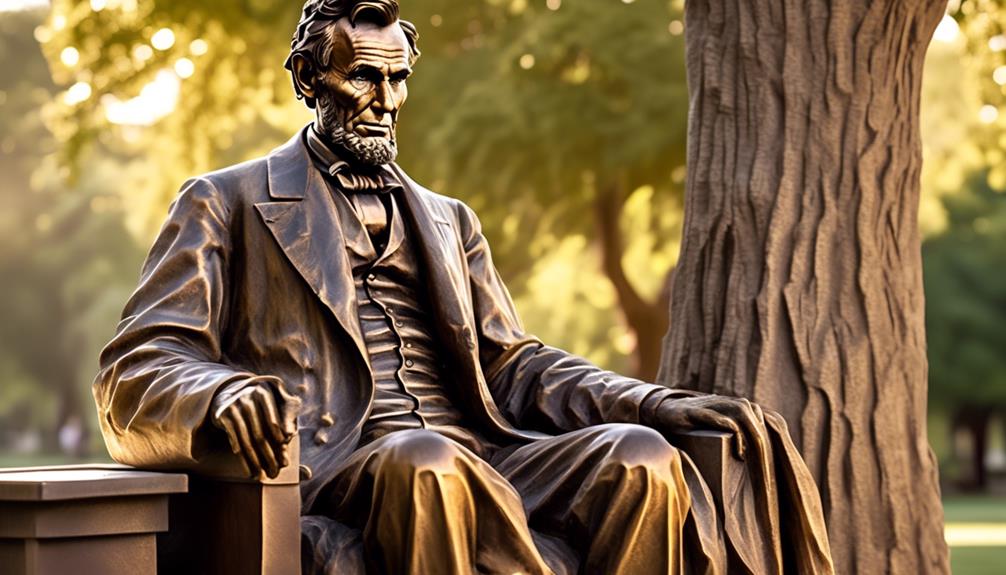As fans of Abraham Lincoln, we are captivated by the insightful wisdom he imparted. The 16th President of the US, Lincoln’s sayings still echo in our lives today. His extraordinary leadership skills, steering our country through periods of turmoil while upholding honesty and fairness, is genuinely motivating.
The power of his words to bring about unity and shape our national identity cannot be underestimated. Lincoln's perseverance and determination in the face of adversity, coupled with his wisdom in decision-making, set him apart as a remarkable leader.
His quotes offer us hope and optimism, reminding us of the legacy and impact he left behind. Join us as we delve into the wisdom of Abraham Lincoln and uncover the timeless lessons he imparted.
Key Takeaways
- Abraham Lincoln's leadership showcased qualities such as clear communication, adaptability, empathy, and humility.
- He was committed to equality and justice, as demonstrated by his unwavering dedication to these ideals even in the face of adversity.
- Lincoln's legacy includes the Emancipation Proclamation, the Gettysburg Address, and his pivotal role in shaping American history through the preservation of the Union.
- His influence extends to the Civil Rights Movement, as his efforts laid the groundwork for future advancements in civil rights.
The Importance of Integrity
The importance of integrity can't be overstated, as it's a fundamental virtue that guides our actions and shapes our character. In the pursuit of mastery, honesty and trustworthiness play a crucial role.
Honesty is the foundation of integrity, as it requires us to be truthful in our words and actions. When we consistently uphold honesty, we build trust with others and establish a reputation for reliability and dependability.
Trustworthiness, on the other hand, goes beyond just being honest. It encompasses being consistent, keeping promises, and acting with integrity even when no one is watching. Trust is the cornerstone of any successful relationship, whether it be personal or professional. Without trust, it becomes difficult to collaborate, cooperate, or build meaningful connections.
In the quest for mastery, our actions must align with our values, and integrity serves as a compass that guides us in making ethical decisions. It helps us navigate through challenges and temptations, ensuring that we stay true to our principles.
Ultimately, integrity not only shapes our character but also influences the perception others have of us. It's a virtue that sets us apart and earns the respect of those around us.
Leadership in Times of Crisis

When it comes to leadership in times of crisis, there are certain traits that are crucial for success. Abraham Lincoln, a renowned leader during the Civil War, possessed many of these traits, such as resilience, empathy, and the ability to inspire.
His crisis strategies, such as his emphasis on teamwork and his willingness to adapt, also played a significant role in his success.
Crisis Leadership Traits
During times of crisis, effective leadership requires a combination of resilience, adaptability, and strategic decision-making. Crisis management demands leaders who can navigate uncertainty and make tough choices in the face of adversity. Here are three key traits that define crisis leadership:
- Resilience: Leaders must possess the ability to bounce back from setbacks and maintain a positive mindset. They inspire confidence in their team, instilling hope and determination even in the most challenging circumstances.
- Adaptability: In times of crisis, circumstances can change rapidly. Effective leaders are agile and able to adjust their strategies to align with new realities. They embrace change and encourage their team to do the same.
- Strategic decision-making: Crisis situations require leaders to make critical decisions under pressure. They analyze available information, assess risks, and choose the best course of action. These decisions are guided by a clear vision and the long-term goals of the organization.
Lincoln's Crisis Strategies
Abraham Lincoln's crisis strategies exemplify the resilience, adaptability, and strategic decision-making necessary for effective leadership during times of turmoil.
One of Lincoln's key communication strategies was his ability to manage public opinion. He recognized the importance of shaping public perception and used various methods to achieve this.
Lincoln's mastery of public speaking allowed him to connect with the American people and rally support for his initiatives. He utilized the power of his words to inspire and unite, effectively conveying his vision and goals.
Additionally, Lincoln understood the significance of the press in shaping public opinion. He strategically utilized newspaper editors to disseminate his message and counter opposing viewpoints.
Lessons From Lincoln's Leadership
Lincoln's crisis strategies, with their emphasis on effective communication and public opinion management, offer valuable lessons in leadership during times of turmoil. As we examine Lincoln's leadership qualities and decision-making skills, we can learn the following lessons:
- Clear communication: Lincoln understood the importance of effectively conveying his message to the public and rallying support for his initiatives. His speeches and writings showcased his ability to articulate his vision and inspire others.
- Adaptability: Lincoln demonstrated the ability to adapt to changing circumstances and make tough decisions. He was willing to evolve his strategies and policies in response to new information or challenges.
- Empathy and humility: Despite the immense pressure and responsibility he faced, Lincoln remained humble and empathetic towards others. He actively sought differing opinions and perspectives, recognizing the value of diverse viewpoints in decision-making.
Equality and Justice for All
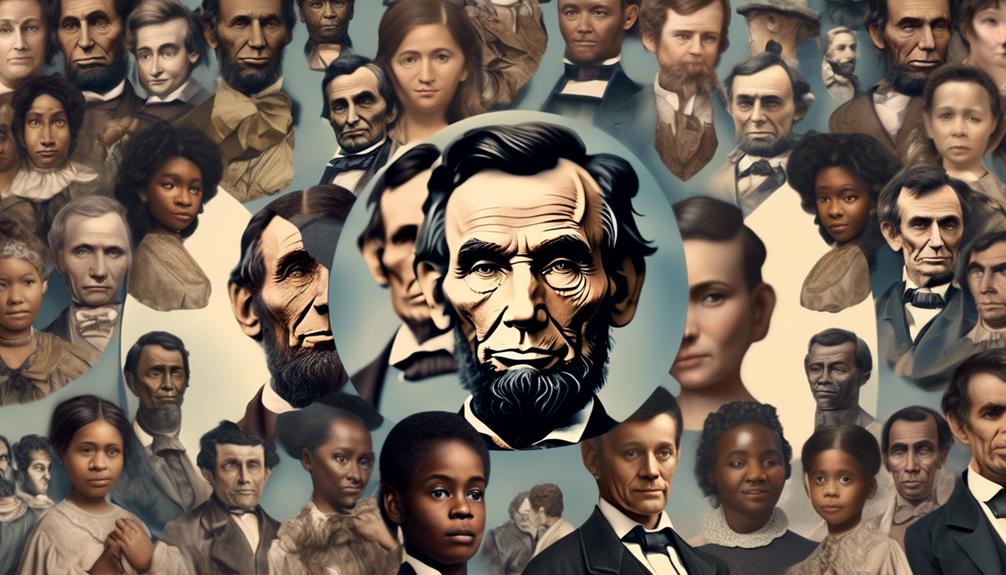
Throughout history, the pursuit of equality and justice for all has been a fundamental aspect of societies worldwide. Abraham Lincoln, the 16th President of the United States, embodied these ideals and demonstrated exemplary leadership qualities in his efforts to ensure equality and justice for all Americans.
One of Lincoln's most famous quotes captures the essence of his belief in equality: 'I am not bound to win, but I'm bound to be true. I'm not bound to succeed, but I'm bound to live up to what light I have.' This quote reflects Lincoln's unwavering commitment to the principles of equality and justice, even in the face of adversity.
Lincoln's leadership qualities were instrumental in shaping the trajectory of the United States during a pivotal period in history. He recognized the importance of unity and actively worked towards creating a more just society. His Emancipation Proclamation, issued in 1863, played a significant role in ending slavery and promoting equality for African Americans.
Furthermore, Lincoln's dedication to justice was exemplified through his leadership during the Civil War. He tirelessly fought to preserve the Union and bring an end to the institution of slavery, ultimately leading to the passage of the Thirteenth Amendment, which abolished slavery.
The Power of Words

During his presidency, Abraham Lincoln effectively communicated his beliefs in equality and justice through the power of his words. His eloquence and skill in persuasive communication played a crucial role in shaping public opinion and garnering support for his policies.
Here are three ways in which Lincoln harnessed the power of communication to achieve his goals:
- Masterful rhetoric: Lincoln was a master of rhetoric, using language strategically to convey his ideas and evoke emotions. His famous speeches, such as the Gettysburg Address and the Emancipation Proclamation, showcased his ability to inspire and convince others.
- Emotional appeal: Lincoln understood the importance of connecting with his audience on an emotional level. He often used poignant anecdotes and vivid imagery to stir empathy and ignite a sense of shared purpose among his listeners.
- Clarity and simplicity: Lincoln's words were powerful because they were accessible to all. He had a remarkable talent for distilling complex ideas into simple, memorable phrases that resonated with people from all walks of life.
Through his effective persuasion and the power of his communication, Lincoln not only united a divided nation but also laid the foundation for a more inclusive and just society. His legacy serves as a testament to the enduring impact of words in shaping history.
Perseverance and Determination

With unwavering determination, Abraham Lincoln faced numerous challenges and obstacles throughout his life, demonstrating the power of perseverance in achieving one's goals. Lincoln's journey is a testament to the strength of the human spirit and the importance of never giving up.
| Challenge | Obstacle | Outcome |
|---|---|---|
| Poverty | Lincoln grew up in poverty, facing financial struggles from an early age. | Despite the hardships, he persevered and worked hard, eventually becoming a successful lawyer and politician. |
| Political Defeats | Lincoln experienced several political defeats, including losing multiple elections. | Rather than giving up, he used these setbacks as motivation to improve and push forward. His determination paid off when he was elected as the 16th President of the United States. |
| Civil War | The American Civil War was one of the greatest challenges Lincoln faced during his presidency. | Despite the immense pressure and criticism, he remained steadfast in his commitment to preserving the Union and ending slavery. His determination and leadership played a crucial role in the Union's victory.
Throughout his life, Lincoln exemplified perseverance and determination in the face of adversity. His ability to overcome challenges and stay focused on his goals serves as an inspiration to all who face obstacles in their own lives. Lincoln's legacy reminds us that with unwavering determination, anything is possible.
Wisdom in Decision-Making
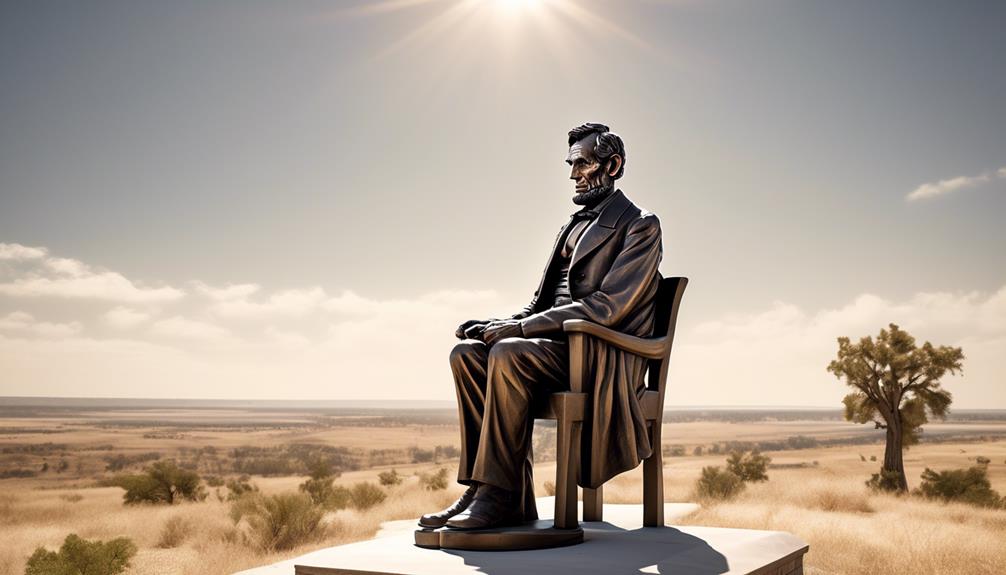
Decisions made with wisdom were a hallmark of Abraham Lincoln's leadership, guiding him through some of the most challenging moments in American history. His ability to navigate crises and make sound decisions was instrumental in shaping the nation and leaving a lasting impact on future generations. Here are three key lessons we can learn from Lincoln's wisdom in decision-making:
- The power of words: Lincoln understood the importance of choosing his words carefully. His speeches and writings conveyed messages of equality, justice, and unity, inspiring hope and optimism during times of adversity.
- Integrity and leadership: Lincoln's decisions were guided by his unwavering commitment to integrity and moral principles. He prioritized the greater good over personal gain, earning the trust and respect of the nation.
- Strengthening the nation: Lincoln's decisions were driven by a vision of a stronger and more united nation. He implemented strategies that aimed to preserve the Union, promote equality, and foster national pride and identity.
Lincoln's wisdom in decision-making serves as a testament to the enduring legacy of his leadership. His ability to make tough decisions with integrity and foresight continues to inspire and influence leaders around the world.
Unity and National Identity
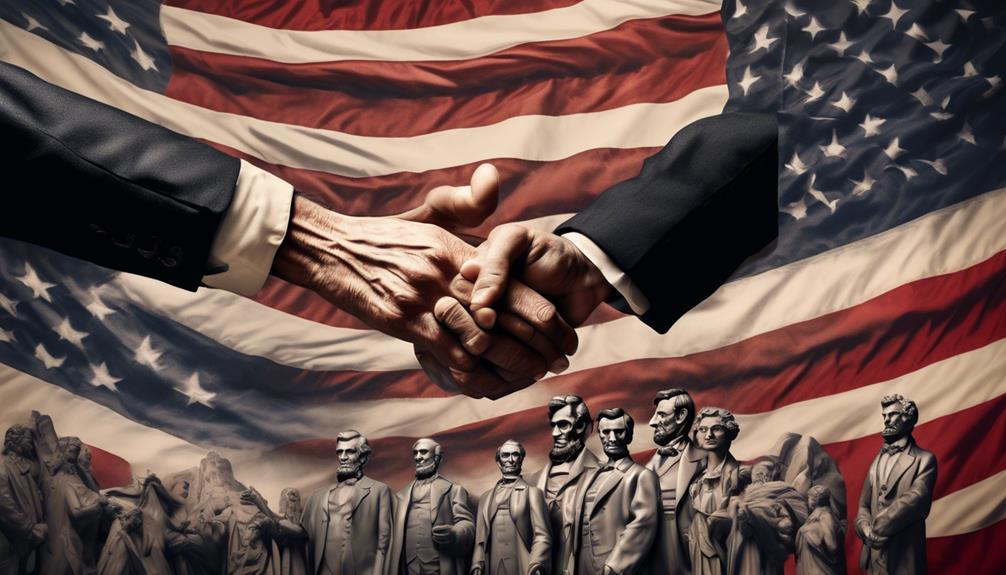
When considering the quotes of Abraham Lincoln, one can't help but notice his emphasis on national pride and unity. Lincoln understood that a strong sense of national identity was crucial for the success and survival of the nation.
His quotes highlight the importance of coming together as a nation, setting aside differences, and working towards a common goal. By strengthening the bonds of unity, Lincoln believed that the nation could overcome any challenge it faced.
National Pride and Unity
National pride and unity are essential factors in fostering a strong sense of collective identity and promoting a cohesive society. As Abraham Lincoln once said, 'A house divided against itself can't stand.' This quote emphasizes the importance of unity in a nation's progress and prosperity.
Here are three reasons why national pride and unity are crucial for strengthening our national identity:
- Cultural Cohesion: A shared sense of pride in our nation's history, traditions, and values brings people together, creating a strong bond among citizens.
- Social Stability: When people feel a sense of belonging and unity, it reduces social divisions and promotes harmony, leading to a more stable society.
- Economic Growth: A united nation can overcome challenges and work towards common goals, resulting in economic development and prosperity for all.
Strengthening the Nation
To strengthen the nation and foster a strong sense of national identity, it's crucial for us to cultivate a collective spirit of unity and solidarity.
National unity is the foundation upon which a country can achieve progress and prosperity. Abraham Lincoln recognized the importance of this unity and emphasized the need for all Americans to work together towards a common goal. He believed that a divided nation couldn't effectively address the challenges it faced.
Hope and Optimism in Adversity

In the face of adversity, maintaining hope and optimism is crucial for navigating the challenges that lie ahead. Abraham Lincoln, the 16th President of the United States, understood the power of hope and resilience in times of difficulty. His words continue to inspire and guide us today.
Here are three quotes from Lincoln that highlight the importance of hope and finding strength in adversity:
- 'We can complain because rose bushes have thorns, or rejoice because thorns have roses.' This quote reminds us that even in the midst of adversity, there's always something positive to be found. By shifting our perspective and focusing on the silver linings, we can find strength and hope.
- 'The best way to predict your future is to create it.' Lincoln believed in the power of taking action and creating our own destiny. In times of adversity, it's important to remember that we've the ability to shape our future. By staying hopeful and optimistic, we can overcome obstacles and create a better tomorrow.
- 'I am a slow walker, but I never walk back.' This quote emphasizes Lincoln's determination and resilience. Despite facing numerous setbacks and challenges throughout his life, he never gave up. It serves as a reminder to stay strong and keep moving forward, even when the road is tough.
Legacy and Impact
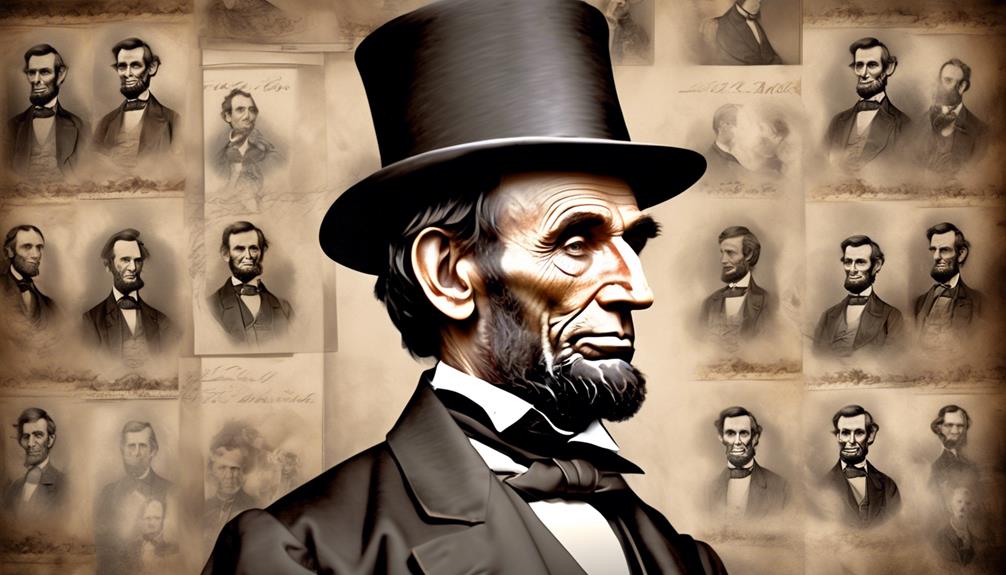
Abraham Lincoln's legacy and impact on American history are undeniable, as his leadership and accomplishments continue to resonate with people around the world. His exceptional leadership qualities and unwavering commitment to preserving the Union during one of the most challenging periods in American history have cemented his place as one of the greatest presidents of the United States.
| Legacy | Impact |
|---|---|
| Emancipation Proclamation | The Emancipation Proclamation, issued by Lincoln in 1862, declared that all slaves in Confederate territory were to be set free. This landmark document not only changed the course of the Civil War but also laid the foundation for the eventual abolition of slavery in the United States. |
| Gettysburg Address | Lincoln's powerful and poignant speech at Gettysburg, delivered in 1863, not only honored the fallen soldiers but also redefined the purpose of the war. His words, "government of the people, by the people, for the people," encapsulated the essence of American democracy and inspired generations to come. |
| Preservation of the Union | Lincoln's unwavering determination to preserve the Union during the Civil War played a pivotal role in shaping the course of American history. His leadership and strategic decisions ultimately led to the defeat of the Confederacy and the reunification of the nation. |
| Assassination and Martyrdom | Lincoln's assassination in 1865 turned him into a martyr and solidified his place in American history. His tragic death further emphasized the immense impact he had on the nation and his enduring legacy as a symbol of freedom, equality, and justice. |
| Influence on Civil Rights Movement | Lincoln's commitment to ending slavery and promoting equality laid the groundwork for the Civil Rights Movement that would take place over a century later. His legacy as a champion for civil rights continues to inspire individuals and movements fighting for justice and equality today. |
Abraham Lincoln's legacy and impact are far-reaching, and his leadership qualities have left an indelible mark on American history. His ability to navigate through immense challenges, his dedication to preserving the Union, and his unwavering commitment to justice and equality make him a revered figure in the hearts and minds of people around the world. His legacy serves as a reminder that great leaders can shape the course of history and inspire generations to strive for a better future.
Frequently Asked Questions
What Were Abraham Lincoln's Major Accomplishments During His Presidency?
During Abraham Lincoln's presidency, he achieved major accomplishments that shaped American history.
Despite the challenges of the Civil War, Lincoln successfully preserved the Union and abolished slavery with the Emancipation Proclamation.
His leadership style was characterized by determination, strategic thinking, and effective communication.
Lincoln's legacy includes his influential views on equality and justice, which continue to shape American society.
His impact on the nation is undeniable, as he transformed the United States into a more unified and inclusive nation.
How Did Abraham Lincoln Handle the Challenges of the Civil War?
During the challenges of the Civil War, Abraham Lincoln exhibited exceptional leadership. He skillfully navigated the complexities of war and held the nation together with his unwavering resolve. Like a seasoned captain guiding a ship through treacherous waters, he steered the country towards unity and freedom.
His ability to inspire and mobilize the people, coupled with his strategic decision-making, ultimately led to the preservation of the Union. Lincoln's steadfastness and determination remain an enduring example of effective leadership during times of war.
What Were Abraham Lincoln's Views on Slavery and How Did They Evolve Over Time?
Abraham Lincoln's views on slavery were complex and evolved over time. Initially, he believed in containing the spread of slavery rather than abolishing it altogether.
However, as the Civil War progressed, Lincoln's stance transformed. He came to see slavery as a moral evil and issued the Emancipation Proclamation, which declared freedom for slaves in Confederate territory.
Lincoln's evolving views on slavery reflected the changing dynamics of the war and his growing commitment to justice and equality for all individuals.
How Did Abraham Lincoln's Leadership Style Contribute to His Success as a President?
Abraham Lincoln's leadership style was instrumental in his success as a president. His ability to inspire and unite the nation during a time of great division was remarkable. Through his clear communication, strategic decision-making, and unwavering determination, Lincoln was able to navigate the challenges of the Civil War and ultimately preserve the Union.
His empathetic and inclusive approach to leadership allowed him to bring together diverse perspectives and forge a path towards a more united and free America.
What Is Abraham Lincoln's Legacy and How Has It Influenced American Society Today?
Abraham Lincoln's legacy is profound and continues to shape American society today. His impact on civil rights is undeniable, as he played a pivotal role in abolishing slavery with the Emancipation Proclamation.
Lincoln's influence on American democracy is equally significant, as he firmly believed in preserving the Union and promoting equality for all citizens. His leadership during the Civil War and his commitment to the principles of freedom and justice have left an indelible mark on our nation's history.
What Similarities and Differences Can Be Observed in the Leadership Styles of Abraham Lincoln and Richard Nixon Based on Their Quotes?
Abraham Lincoln and Richard Nixon had contrasting leadership styles. Lincoln’s quotes focused on unity and equality, such as “A house divided against itself cannot stand.” In contrast, Nixon’s memorable richard nixon insights were often self-reflective and secretive, like “I am not a crook.” Their approaches to leadership differed in transparency and integrity.
Conclusion
In conclusion, Abraham Lincoln's quotes serve as a timeless reminder of the values and principles that define our nation.
His integrity, leadership, and pursuit of justice resonate in our hearts, inspiring us to persevere and make wise decisions.
Lincoln's words have the power to unite us, instilling hope and optimism even in the face of adversity.
His legacy continues to impact our lives, reminding us of the importance of unity and the limitless potential of a united nation.
As Lincoln once said, 'A house divided against itself can't stand.'
